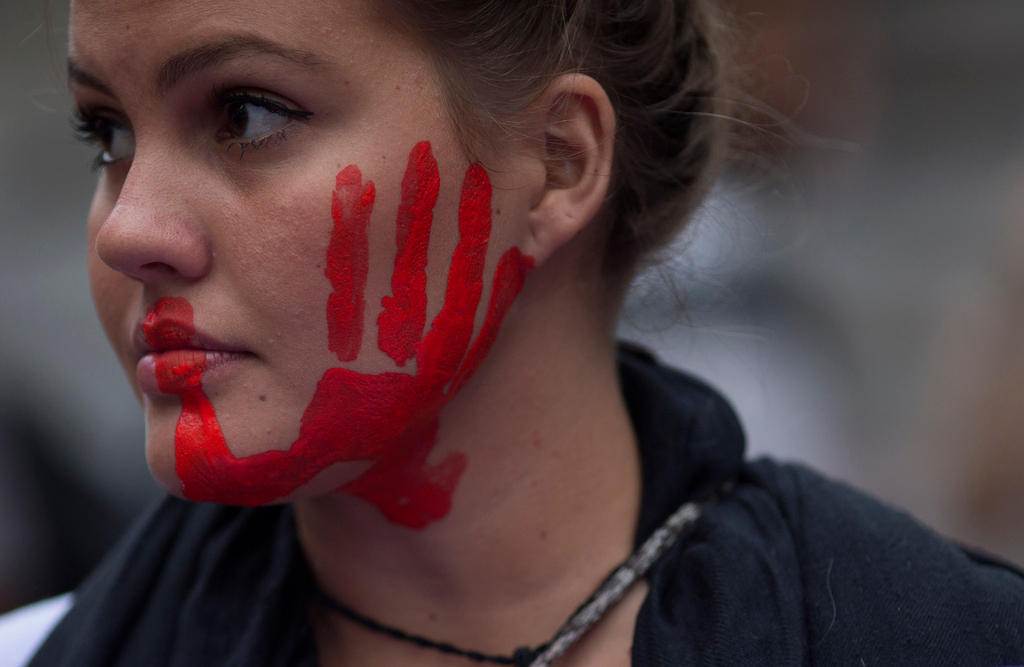‘Invest money’ to stop violence against women

One person dies every two weeks from domestic abuse in Switzerland; most often, it’s a woman. The Swiss authorities must do more to implement the Istanbul Convention to combat this scourge, say campaigners.
Since last year, the #MeToo and #BalanceTonPorc movements have put the spotlight on the problems of sexual abuse and harassment. Violence against women is not a new phenomenon, but it is a widespread and persistent human rights violation.
Non-governmental groups place a great deal of hope in the Council of Europe Convention on preventing and combating violence against women and domestic violence (better known as the Istanbul ConventionExternal link), which entered into force in Switzerland last April.
Ahead of the United Nations-supported International Day for the Elimination of Violence against WomenExternal link on November 25, swissinfo.ch talked to Simone Eggler of Terre des FemmesExternal link about the scale of the problem in Switzerland and possible solutions. Eggler belongs to a new civil society network monitoring the implementation of the Istanbul Convention.
swissinfo.ch: What kinds of domestic abuse and other violence are reported in Switzerland?
Simone Eggler: They are very different: physical, psychological, social and economic. They can take place at home or in public. Sometimes it’s hard to separate them. At the same time, we lack proper statistics. There are lots of numbers on domestic abuse, but actual violence against women is not recorded. One of our demands, which is also written in the Istanbul Convention, is to improve data collection and accuracy. Without this, we cannot monitor the situation and evaluate the effectiveness of the measures taken. It’s the basis of everything.
swissinfo.ch: To what extent will implementing the Istanbul Convention improve things?
S.E.: The text requires Switzerland to fulfil very specific obligations. It’s essential that it’s implemented from A to Z, because there are many gaps in Switzerland. We have lots of support structures, but they are not accessible to everyone. Refugees who are victims of violence during their flight, or people who were not established in the country at the time of the incident are not entitled to victim assistance in Switzerland. This is a serious flaw in the law.
We also have the problem of women who have the right to residency in Switzerland through marriage. If there is violence, often such women don’t want to separate from their husbands in order to avoid losing this right. Some cantons offer special measures to allow them to stay, but unfortunately not all of them do. Implementing the treaty should make it possible to close these gaps.
swissinfo.ch: What additional measures could NGOs benefit from to help them in their work?
S.E.: Under the Istanbul Convention, Switzerland should set up a professional telephone helpline specialising in domestic abuse and violence against women, which can be reached 24 hours a day. At certain times, the only option is to call the police. Sometimes this is necessary, but other times it is too big an obstacle for victims. And in some cases, it is not the best solution. A good system must be put in place to provide assistance that is accessible to everyone at all times.
swissinfo.ch: You also want improvements in the way people deal with those who carry out violence. Is there a typical profile of the people at risk of committing such acts?
S.E.: No, there is no typical profile of either the victim or the perpetrator. Violence is present in all social strata. That is why offers of support must be accessible to all and without discrimination. In Switzerland, there are significant differences between cantons, which do not always have the same resources. This must be harmonised to give everyone the same opportunities, whether in terms of prevention, protection, or working with those who carry out the abuse.
swissinfo.ch: What impact has the #MeToo movement had in helping combat abuse?
S.E.: We have seen greater awareness of what constitutes violence, also on the part of the people caught up in it. The issue is much more present in the media. But it is important to go for long-term solutions over quick and emotional ones. We often hear people saying you just need to give perpetrators tougher sentences. But action at the criminal justice level does not solve anything. You must also invest in improving support structures and research, but that’s expensive. If you want to combat violence against women, you must invest money, otherwise you simply conceal the problem.
According to the UNExternal link, violence against women and girls is one of the most widespread, persistent and devastating human rights violations in our world today remains largely unreported due to the impunity, silence, stigma and shame surrounding it.
The UN says that one in three women and girls experience physical or sexual violence in their lifetime, most frequently by an intimate partner. Half of women killed worldwide were killed by their partners or family in 2012; while only 1 out of 20 men were killed under similar circumstances. Just over half of women married or in a union freely make their own decisions about sexual relations, contraceptive use and health care.
Worldwide, almost 750 million women and girls alive today were married before their 18th birthday; while 200 million women and girls have undergone female genital mutilation (FGM).
Translated from French by Simon Bradley

In compliance with the JTI standards
More: SWI swissinfo.ch certified by the Journalism Trust Initiative









You can find an overview of ongoing debates with our journalists here . Please join us!
If you want to start a conversation about a topic raised in this article or want to report factual errors, email us at english@swissinfo.ch.